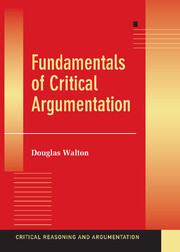EIGHT - PRACTICAL REASONING IN A DIALOGICAL FRAMEWORK
Published online by Cambridge University Press: 05 June 2012
Summary
The argumentation structures analyzed in this chapter are highly typical of the kinds of reasoning commonly used in everyday deliberations. These structures of inference are also used in all aspects of technology, especially in fields such as engineering and medicine, where the objectives are essentially practical in nature, even though the reasoning is based on scientific knowledge. But their root use and their most familiar appearance to us in daily life is in the reasoning we commonly use to decide on which course of action to take, especially where personal choices on how to conduct one's daily life are made and acted on in real situations. As arguments, practical inferences are typically used in the type of dialogue called the deliberation in chapter 6. Deliberation is characterized by the need to arrive at a decision on what to do in a set of circumstances that is not completely known to an agent and that is liable to change in ways that are impossible to predict with certainty. Thus, practical reasoning tends to use argumentation schemes that are neither deductive nor inductive in nature.
We begin with very simple cases of practical inferences, and then, by the end of the chapter, consider so-called real world situations where additional factors need to be taken into account. Such practical inferences are highly familiar and are widely used by everyone.
- Type
- Chapter
- Information
- Fundamentals of Critical Argumentation , pp. 299 - 334Publisher: Cambridge University PressPrint publication year: 2005



